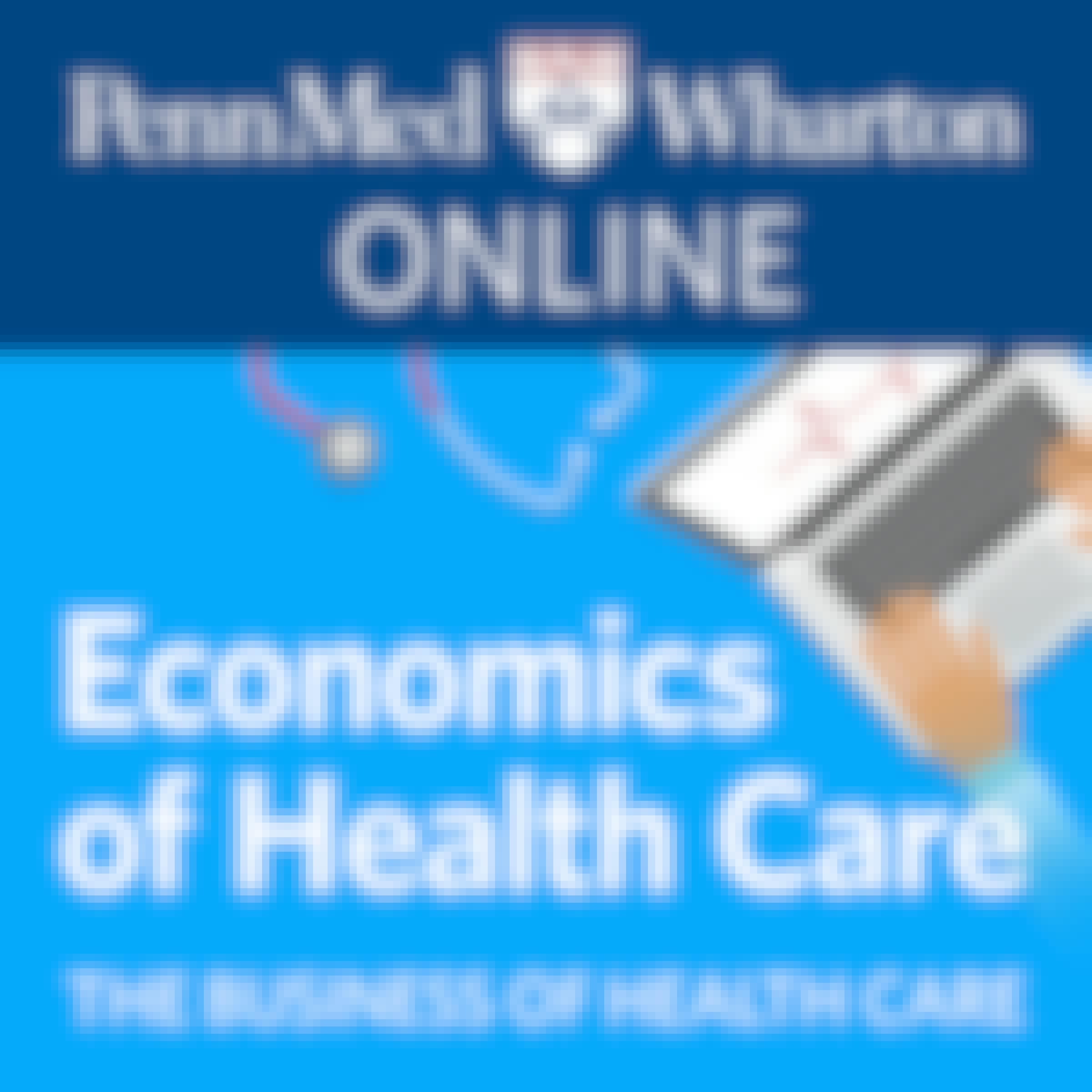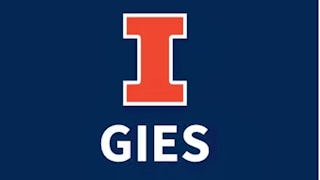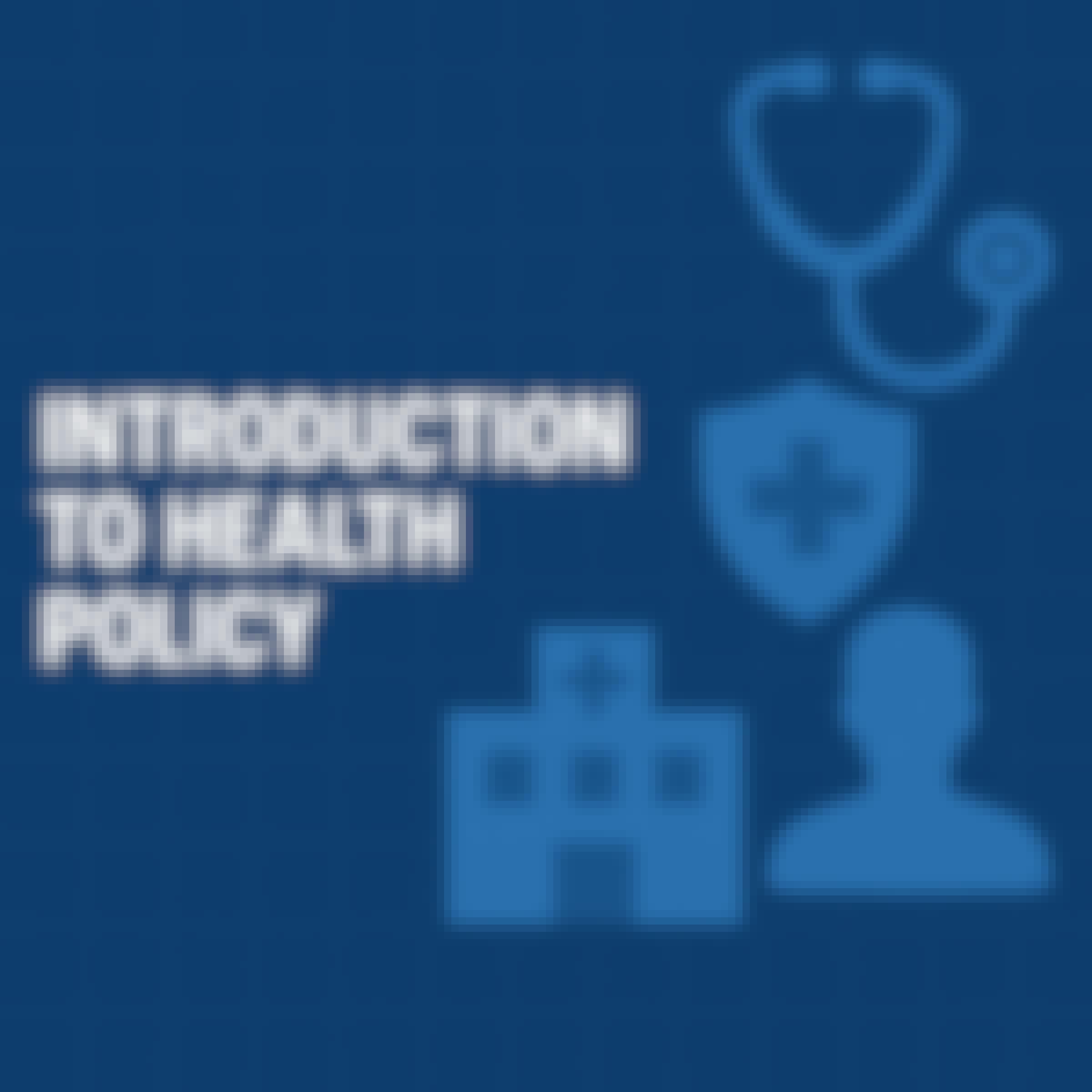- Browse
- Health Economics
Health Economics Courses Online
Study health economics for understanding healthcare markets. Learn about cost-benefit analysis, health policy, and economic evaluation in healthcare.
Filter by
SubjectRequired *
LanguageRequired *
The language used throughout the course, in both instruction and assessments.
Learning ProductRequired *
LevelRequired *
DurationRequired *
SkillsRequired *
SubtitlesRequired *
EducatorRequired *
Explore the Health Economics Course Catalog
 Status: Free TrialFree TrialU
Status: Free TrialFree TrialUUniversity of Pennsylvania
Skills you'll gain: Managed Care, Health Systems, Health Care Administration, Health Care Procedure and Regulation, Health Care, Value-Based Care, Medicaid, Insurance, Health Policy, Medicare, Economics, Behavioral Economics, Supply And Demand, Market Dynamics, Long Term Care, Payment Systems, Hospice
4.8·Rating, 4.8 out of 5 stars695 reviewsMixed · Course · 1 - 4 Weeks
 Status: NewNewStatus: Free TrialFree TrialU
Status: NewNewStatus: Free TrialFree TrialUUniversity of Illinois Urbana-Champaign
Skills you'll gain: Product Development, Health Systems, Business Planning, Lean Six Sigma, Social Determinants Of Health, Performance Improvement, Process Improvement, Healthcare Industry Knowledge, Stakeholder Analysis, Statistical Process Controls, New Product Development, Risk Management, Innovation, Sustainable Business, Decision Making, Health Equity, Operations Management, Operations, Problem Solving, Leadership
Build toward a degree
Intermediate · Specialization · 3 - 6 Months
 Status: PreviewPreview
Status: PreviewPreviewSkills you'll gain: Health Policy, Decision Support Systems, Data-Driven Decision-Making, Health Assessment, Analysis, Health Technology, Health Care, Value-Based Care, Pharmaceutical Terminology, Medical Terminology, Risk Analysis, Clinical Trials, Systems Of Measurement
4.5·Rating, 4.5 out of 5 stars19 reviewsIntermediate · Course · 1 - 4 Weeks
 Status: PreviewPreviewY
Status: PreviewPreviewYYale University
Skills you'll gain: Health Disparities, Health Systems, Public Health, Epidemiology, Social Determinants Of Health, Health Equity, Health Care, Infectious Diseases, Chronic Diseases, Health Policy, Environment Health And Safety, Medical Science and Research, Injury Prevention, Nutrition and Diet
4.8·Rating, 4.8 out of 5 stars2.2K reviewsMixed · Course · 1 - 3 Months
 Status: Free TrialFree TrialI
Status: Free TrialFree TrialIImperial College London
Skills you'll gain: Analytical Skills, Correlation Analysis, Regression Analysis, Sampling (Statistics), Statistical Hypothesis Testing, Data Literacy, R (Software), Data Analysis, R Programming, Descriptive Statistics, Statistical Modeling, Biostatistics, Exploratory Data Analysis, Statistical Analysis, Statistical Methods, Statistics, Public Health, Statistical Inference, Probability & Statistics, Time Series Analysis and Forecasting
4.7·Rating, 4.7 out of 5 stars2.1K reviewsBeginner · Specialization · 3 - 6 Months
 Status: Free TrialFree TrialU
Status: Free TrialFree TrialUUniversity of Pennsylvania
Skills you'll gain: People Management, Financial Reporting, Financial Acumen, Financial Data, Financial Statements, Social Determinants Of Health, Managed Care, Operations Management, Income Statement, Employee Performance Management, Financial Analysis, Leadership and Management, Health Systems, Health Care Administration, Innovation, Value-Based Care, Business Reporting, Decision Making, Health Care Procedure and Regulation, Insurance
4.6·Rating, 4.6 out of 5 stars2K reviewsBeginner · Specialization · 3 - 6 Months
What brings you to Coursera today?
 Status: Free TrialFree TrialJ
Status: Free TrialFree TrialJJohns Hopkins University
Skills you'll gain: Biostatistics, Statistical Hypothesis Testing, Regression Analysis, Sampling (Statistics), Statistical Methods, Statistical Visualization, Statistical Analysis, Epidemiology, Medical Science and Research, Quantitative Research, Descriptive Statistics, Statistical Inference, Data Literacy, Probability Distribution, Scientific Methods, Statistics, Statistical Modeling, Data Analysis, Probability & Statistics, Public Health
4.8·Rating, 4.8 out of 5 stars2.4K reviewsBeginner · Specialization · 3 - 6 Months
 Status: Free TrialFree TrialU
Status: Free TrialFree TrialUUniversity of Minnesota
Skills you'll gain: Competitive Analysis, Medical Devices, Payment Systems, Intellectual Property, Health Systems, Healthcare Industry Knowledge, Commercialization, Leadership Development, Health Care Administration, Managed Care, Product Management, Go To Market Strategy, Regulatory Affairs, New Product Development, Hospital Experience, Pharmaceuticals, Organizational Structure, Market Opportunities, Medical Equipment, Health Care
4.5·Rating, 4.5 out of 5 stars1.5K reviewsBeginner · Specialization · 3 - 6 Months
 Status: Free TrialFree TrialU
Status: Free TrialFree TrialUUniversity of Michigan
Skills you'll gain: Health Care Administration, Clinical Leadership, Community Health, Financial Statements, Mergers & Acquisitions, Financial Accounting, Public Health, People Management, Financial Statement Analysis, Human Resources Management and Planning, Strategic Decision-Making, Financial Analysis, Health Systems, Electronic Medical Record, Return On Investment, Balance Sheet, Business Valuation, Accounting, Strategic Planning, Marketing
4.7·Rating, 4.7 out of 5 stars115 reviewsBeginner · Specialization · 1 - 3 Months
 Status: Free TrialFree TrialJ
Status: Free TrialFree TrialJJohns Hopkins University
Skills you'll gain: Surveys, Program Evaluation, Survey Creation, Health Policy, Sampling (Statistics), Health Systems, Health Assessment, Health Equity, Data Collection, Quantitative Research, Maternal Health, Data Management, Statistical Analysis, Analysis, Nutrition and Diet, Public Health, Research Design, Nutritional Assessment, Data Cleansing, Data Analysis
4.6·Rating, 4.6 out of 5 stars66 reviewsIntermediate · Specialization · 3 - 6 Months
 Status: PreviewPreviewY
Status: PreviewPreviewYYale University
Skills you'll gain: Behavioral Economics, Storytelling, Data Storytelling, Economics, Economic Development, Financial Forecasting, Forecasting, Socioeconomics, Social Studies, Consumer Behaviour, Analysis, Complex Problem Solving
4.8·Rating, 4.8 out of 5 stars857 reviewsBeginner · Course · 1 - 4 Weeks
 Status: NewNewStatus: PreviewPreviewO
Status: NewNewStatus: PreviewPreviewOO.P. Jindal Global University
Skills you'll gain: Health Disparities, Health Equity, Social Determinants Of Health, Health Systems, Public Health, Health Policy, Health Care, Epidemiology, Social Justice, Social Sciences, Demography, Economics
Build toward a degree
Beginner · Course · 1 - 3 Months
Health Economics learners also search
In summary, here are 10 of our most popular health economics courses
- The Economics of Health Care Delivery: University of Pennsylvania
- Healthcare Innovation, Design, Entrepreneurship: University of Illinois Urbana-Champaign
- Data Science in Health Technology Assessment: Genentech
- Essentials of Global Health: Yale University
- Statistical Analysis with R for Public Health: Imperial College London
- The Business of Health Care: University of Pennsylvania
- Biostatistics in Public Health: Johns Hopkins University
- Healthcare Marketplace: University of Minnesota
- Healthcare Management and Finance: University of Michigan
- Evaluating Large-Scale Health Programs: Johns Hopkins University
Frequently Asked Questions about Health Economics
Health Economics refers to the business insight, healthcare management, and healthcare policy of healthcare systems provided to communities by enterprises, governments, or related entities. Typically, this is applied to the principles and pricing strategies behind healthcare and its key concepts.
By getting an understanding of the complex structure of healthcare and health insurance, an education in Health Economics empowers learners with the financial and management skills to build a foundational understanding of healthcare systems; make better, well-informed decisions based on research; and help to improve the cost and quality of healthcare.
According to the Bureau of Labor Statistics, the employment of medical and health services managers is projected to grow 18% through 2028. Prospective managers typically have some work experience in an administrative or clinical role in a hospital or other healthcare facility, with related jobs such as Computer and Information Systems Managers, Financial Managers, Human Resources Managers, Insurance Underwriters, Medical Health and Information Technicians, Social and Community Services Managers, and more.
Learners who study Health Economics through Coursera have many opportunities to apply key concepts related to the subject through case studies and financial statements from healthcare initiatives.
Foundational topics such as the history of insurance, role of hospitals in the healthcare ecosystem, and range of healthcare providers are covered to bolster basic understanding that leads to critical thinking and skill building in Health Economics.
Lessons feature input from experts on the acumen, management, and policy of this fast-growing field. Successful learners will be able to apply management and financial skills to their own practice by maximizing cost and efficiency of insurance and healthcare operations.
The field of health economics combines business knowledge with experience in the health care industry, so time spent working in the business office of a doctor’s practice or hospital can be beneficial for a career in health economics. An understanding of how insurance companies and government health care programs work with individual practices and larger hospital systems is also helpful in gaining a foothold in health economics. Knowledge of accounting and budgeting practices can help you with the concepts of health economics as well. Even if you don’t have a health care background, any level of business acumen gives you a head start in grasping how health economics works.
Anyone who has worked in the business side of the health care industry is a good candidate for a health economics career. People who have a keen understanding of how health care processes work—from the patient’s perspective as well as the provider’s point of view—are also well suited for the discipline of health economics. Individuals who are interested in making the health care system more affordable and efficient for patients, doctors, and hospital systems can put that passion to good use in jobs in health economics. Someone with an organizational mind who can devise processes that improve costs and efficiency may be able to succeed in health economics careers.
Studying health economics might be right for you if you’re interested in discovering ways to make the growing health care industry more efficient and cost-effective. This field sits at the crossroads of business and health care, so if you have experience in both worlds, it’s an area of study that might hold your interest. Learning about health economics can work to your advantage if you’re interested in a career in hospital management or on the business side of larger health care practices. The diversity of job opportunities in research, academia, and insurance may also mean that learning about health economics is a good idea for you.
Online Health Economics courses offer a convenient and flexible way to enhance your knowledge or learn new Health Economics skills. Choose from a wide range of Health Economics courses offered by top universities and industry leaders tailored to various skill levels.
When looking to enhance your workforce's skills in Health Economics, it's crucial to select a course that aligns with their current abilities and learning objectives. Our Skills Dashboard is an invaluable tool for identifying skill gaps and choosing the most appropriate course for effective upskilling. For a comprehensive understanding of how our courses can benefit your employees, explore the enterprise solutions we offer. Discover more about our tailored programs at Coursera for Business here.










